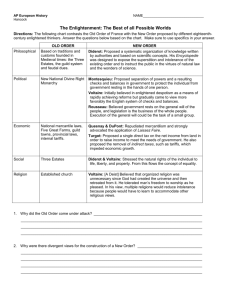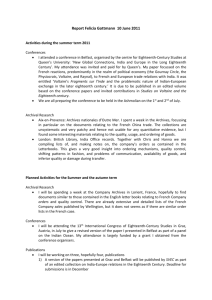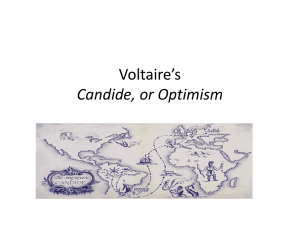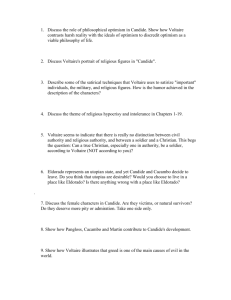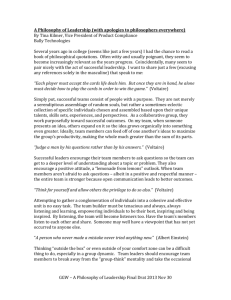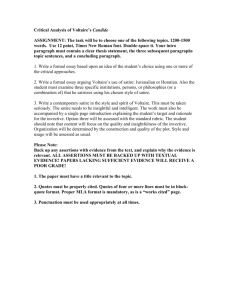VOLTAIREolder
advertisement
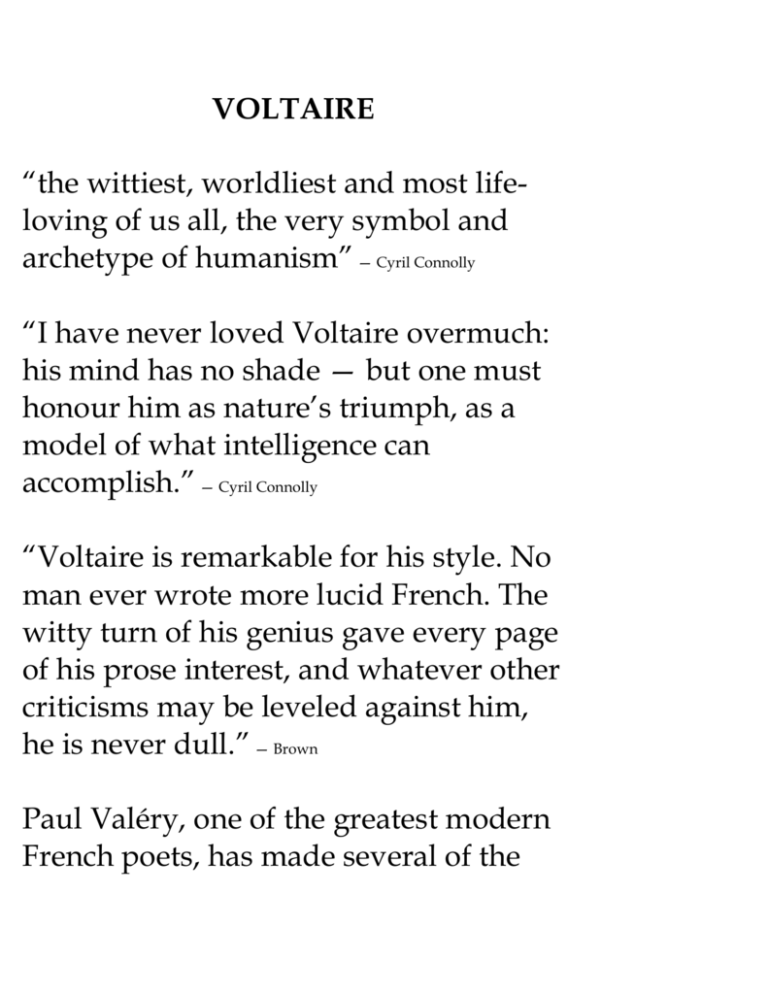
VOLTAIRE “the wittiest, worldliest and most lifeloving of us all, the very symbol and archetype of humanism” — Cyril Connolly “I have never loved Voltaire overmuch: his mind has no shade — but one must honour him as nature’s triumph, as a model of what intelligence can accomplish.” — Cyril Connolly “Voltaire is remarkable for his style. No man ever wrote more lucid French. The witty turn of his genius gave every page of his prose interest, and whatever other criticisms may be leveled against him, he is never dull.” — Brown Paul Valéry, one of the greatest modern French poets, has made several of the most incisive and useful remarks on Voltaire. He wrote, for example, that Voltaire was: “specifically French and unimaginable under any other skies—I would even say, under any other sky than Paris. The result is that in France, after two hundred and fifty years, his name still provokes strong and sharply conflicting reactions. Some people still fear and detest the man who delighted in ridiculing the objects of their beliefs, in heaping up mockery designed to destroy their faith, in pitting the letter of the Scriptures against their deeper meaning and their spirit. Other people see in him the apostle of freedom of thought and the defender of the sacred rights that every man owes it to himself to grant to every other man.” — Valéry Cp. Joyce in Ireland. Voltaire was “a man on whom Joseph de Maistre, who admired and detested him, pronounced this antithetical verdict in which he combined his doctrine and his taste: ‘I should like,’ he said, ‘to have a statue raised to him … by the public executioner.’” — Valéry “Voltaire replaced massive argument by the tactics of speed, short thrusts, feints, and a harassing irony. He moved from the logical to the comical, from good sense to pure fantasy, exploited all the weaknesses of his opponent and then tossed him to one side looking ridiculous, if he did not end by making him completely odious. It was in this way that he achieved one very considerable result which has not attracted sufficient attention. What is known as ‘opinion’ had been created up to that time by the Court of Versailles; it spread from there to the City, and thence, after a certain time, might reach a comparatively small number of aristocrats and people of breeding living in the provinces. Voltaire broke this circle and extended the sphere of action of the written word. His style, the immense interest aroused by his appeals for justice, and the sort of scandal they created, attracted throughout the kingdom and beyond its frontiers a large number of readers. What had been the attitude of the Court and the City became the opinion of the public. Here we can see the full import and significance of a mere change in style: the public was created by an easy style. Simply increase the numbers still more; relax all the rules and restraints of language, making it immediately accessible to the masses; borrow from the masses their familiar and picturesque expressions, and the word ‘public’ can no longer be applied to that collective body at which the written word is aimed — to rouse, convince, and goad it into action. We must speak of the people, and the whole of the Revolution is contained in that one word.” — Valéry “He had the gall to believe in nothing, or to think he did. And he forced his view onto the public. Freedom of thought has belonged ever since to the general public — no longer the preserve of the few…. In short, Voltaire is a divide in the history of Europe. After him, all religious thought became a special case, a paradox, or a prejudice.” — Valéry And finally: “Voltaire is the classic par excellence, much more classical than the 17th-century authors [who in France are the classics]….” — Valéry CANDIDE Published anonymously in Geneva in 1759, when Voltaire was 65. It was widely denounced, and he was accused of writing it, which he denied. Cp. Robinson Crusoe, 40 years earlier. Shortly after Candide’s publication, a magazine asserted, correctly of course, that there was no kingdom of the Jesuits in Paraguay, and that the book had actually been written by Voltaire. Voltaire, using the pseudonym “Demad,”sent the magazine a letter forcefully denying both assertions and saying that the book had been written by his brother, Captain Demad. He dated the letter April 1, which had the same significance for eighteenthcentury Parisians that it does for us. Candide is literally ‘a mixture of ridicule and horror’ [Voltaire], an unflinching scrutiny of the miseries of life carried on with comic detachment.” — Aldridge “Candide is, above all, a rollicking and caustic satire which deals a strong blow at the blissful optimism of the inveterate followers of Leibnitz. Voltaire had for a time leaned towards philosophical optimism, but his own experience at the hands of men and circumstances brought him to consider at close range the problem of evil in the world. [Cp. Job and Paradise Lost from 2330 — Indeed, Voltaire called it “Job brought up to date.”]…. Voltaire, disgusted with human stupidity and crulety, had in mind one single objective: to make fun of man’s aberrations and heap sarcasm on them.” — Brown “Voltaire’s major philosophical themes are not as apparent in his title, Candide or Optimism, Translated from the German of Doctor Ralph, as they are in the title of the metaphysical treatise by Leibnitz, which he is attacking, Essay of Theodicy on the Goodness of God, the Liberty of Man and the Origin of Evil. In both works, the questions of the goodness of god and the origin of evil are interrelated, as are those of free will and determinism.”— Aldridge “The completely opposite point of view is expressed by two characters who serve as foils to Candide and his mentor: Jacques, a charitable Anabaptist, expounds the doctrine of the moral degeneration of man [Anabaptists—that is, Again-baptized— wouldn’t, among other things, bear arms, use force, or hold government office]; and Martin, nominally a Manichean, teaches the supremacy of evil rather than a balance of evil and good. Both are more often than not spokesmen for Voltaire.” — Aldridge “It is true that he [Voltaire] no longer believes in a beneficial Providence, yet he still has faith in true progress. Indeed, his opponents who proclaim that ‘all is for the best are precisely those who would like to maintain humanity in the lamentable situation in which it is at the present, and always by invoking the most sacred causes.” — Brown Voltaire “has been accused of excessive sarcasm without the redeeming counterbalance of adequate moral teaching. . . . [For the remaining 18 years of his life, though,] he strove with youthful ardor and disintertestedness to act, to work, to struggle against ignorance and tyranny, to build, to sow, to defend the cause of the oppressed and underprivileged.” — Brown “The basic structure of Candide consists of a naïve, idealistic mind coming into constant contact with opposing realities. Doctrines are repeated by events, not arguments.” — Aldridge In this sense, Voltaire belongs more with the realists than with the Neoclassicists. “One of Voltaire’s purposes is to parody the romance of adventure and the socalled philosophical novels which were in vogue at the time.” — Brown Cp. Don Quixote if they have taken English 2330 CONCLUSION: “Voltaire’s conclusion, ‘We must cultivate our garden,’ is at one and the same time his most modest and most sweeping statement. Work not only eliminates the three great curses of mankind—want, boredom, and vice—it also transforms the chronological sequence of a lifetime, in itself a mere elapsing of time, into a creation that constantly renews itself…. [Man] must keep from useless theorizing, for that will not teach him that most important task of all: the art of living. Resigned in the end to accepting an absurd reality— there is no viable alternative—Voltaire shows us how to make the best of a bad situation and suggests that, on a small scale at least, improvement may be possible.” — Peyton Richter & Ilona Ricardo

